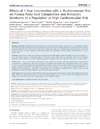Please use this identifier to cite or link to this item:
https://accedacris.ulpgc.es/handle/10553/113997
| Title: | Effects of 1-Year Intervention with a Mediterranean Diet on Plasma Fatty Acid Composition and Metabolic Syndrome in a Population at High Cardiovascular Risk | Authors: | Mayneris-Perxachs, J Sala-Vila, A Chisaguano, M Castellote, AI Estruch, R Covas, MI Fito, M Salas Salvado, J Martinez-Gonzalez, MA Lamuela-Raventos, R Ros, E Lopez-Sabater, MC |
Editors: | Atkin, Stephen L. | UNESCO Clasification: | 32 Ciencias médicas 3206 Ciencias de la nutrición 320502 Endocrinología 320704 Patología cardiovascular |
Keywords: | Diet Type 2 diabetes Fats Blood plasma Fatty acids, et al |
Issue Date: | 2014 | Journal: | PLoS ONE | Abstract: | Background & Aims: Metabolic syndrome (MetS) has become an important public concern due to its increasing prevalence. An altered fatty acid composition has been associated with MetS, but the Mediterranean diet has been shown to have a protective effect. The aim of the present study was to analyze the influence of a Mediterranean dietary pattern, as assessed by the biomarkers of food supplied, on the plasma fatty acid composition and its relation with MetS after 1 year of intervention. Methods: A total of 424 subjects were randomly selected from the PREDIMED randomized dietary trial after completing a 1-year intervention program. Participants aged 55 to 80 years and at high risk of cardiovascular disease were randomly assigned to three dietary interventions: Mediterranean diet supplemented with virgin olive oil or nuts, or a low-fat diet. Results: After 1 year of intervention participants in the virgin olive oil group showed significantly increased plasma concentrations of palmitic and oleic acids, but reduced proportions of margaric, stearic, and linoleic acids. In turn, subjects in the nut group showed significantly increased levels of palmitic, linoleic, and α-linolenic acids, but reduced proportions of myristic, margaric, palmitoleic, and dihommo-γ-linoleic acids. Increases in the biomarkers of foods supplied to the Mediterranean diet groups, i.e., oleic and α-linolenic acids, were beneficially associated with the incidence, reversion and prevalence of MetS. No weight changes were observed among participants. Conclusions: The nut and olive oil diets induced a fatty acid composition that has been shown to be beneficial in the face of MetS. Therefore, a Mediterranean diet rich in fats of vegetable origin may be a useful tool for the management of MetS without the need for concerns over weight gain due to its high fat content. | URI: | https://accedacris.ulpgc.es/handle/10553/113997 | ISSN: | 1932-6203 | DOI: | 10.1371/journal.pone.0085202 | Source: | PLoS ONE [ISSN 1932-6203], v. 9 (3) e85202 (Marzo 2014) |
| Appears in Collections: | Artículos |
SCOPUSTM
Citations
62
checked on Jun 8, 2025
WEB OF SCIENCETM
Citations
57
checked on Jun 8, 2025
Page view(s)
59
checked on Apr 15, 2023
Download(s)
12
checked on Apr 15, 2023
Google ScholarTM
Check
Altmetric
Share
Export metadata
Items in accedaCRIS are protected by copyright, with all rights reserved, unless otherwise indicated.
